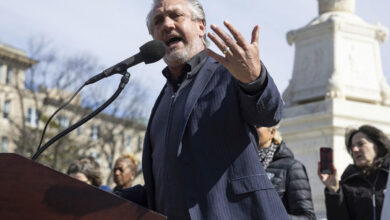After the 2025 Dutch professional racing calendar was plunged into doubt due to an upcoming NATO summit, the KNWU (Royal Dutch Cycling Union) has made progress in training “civilian motorcycle traffic controllers” to ensure racing goes ahead.
Despite the meeting of NATO’s 32 members in the Hague only taking place over two days in June, the KNWU announced in November that police requirements would mean “an absence of motorcycle officers at cycling races for almost the entire cycling season.”
After working to accelerate the deployment of civilian motorcycle traffic controllers, the Dutch Union has now received €215,000 from the House of Representatives for setting up a training course “to ensure that cycling can prepare for a future with less police escort.”
It’s also hoping this can be a long-term solution so they can take over the police in future, when safe and desirable. Discussions with the Dutch National Police are ongoing to see whether police presence at races could still happen in 2025.
“The KNWU regularly consults with the National Police about the deployment of police motorcycle officers in general and for cycling races in 2025 in particular. This has become more important now that there is no or very limited capacity available due to the preparations for the NATO summit,” said KNWU president Maurice Leeser in his New Year’s column.
“The police has promised to investigate whether there are still possibilities to deploy police motorcycle officers at cycling races. However, we take into account that, even if a small number are available, they can only make a limited contribution. This means that the vast majority of cycling races in 2025 will have to take place without police escort.
“It is good that we have taken matters into our own hands because regardless of the outcome of our follow-up consultation, it is clear that the use of these motorcycle escort teams will be crucial for the supervision of cycling races in 2025 and the following years.”
As police presence at bike races in the Netherlands has reduced in the past decade, with a ban even being imposed on local motorcycle use in 2023, the calendar has seen more circuit races introduced to alleviate the issue. However, with a plan and more funding available for the training of civilian motorcycles, the KNWU could have a long-term fix.
Following a report from consultancy organisation Antea, several government ministries requested that the Union go ahead and develop the training course for the traffic controllers to be road safe, for the cycling caravan and other in-race traffic, and certified.
“With the available resources, thanks to the recent amendment,” which brought in the €250,000, “this can now be put into practice,” read a statement on the KNWU’s website.
It will work in collaboration with The Royal Dutch Motorcyclists Association (KNMV) to develop the necessary training courses and certifications.
The one-day WorldTour men’s and women’s event, the Amstel Gold Race, is the biggest event on the Dutch calendar between the January 1 to August 31 period of restriction, with nine total races above a .1 level scheduled in that window.
KNWU manager of competitive sports Joost van Wijngaarden said race organisers will be offered three scenarios in the coming year: deployment of 200 traffic controllers, a collaboration between police and civilian motorcyclists, or racing on a 10-25km circuit protected by permanent traffic security officers.
“In 2025, the third option is the most realistic for many organisers because of the limited deployment of police as a result of the hours required to secure the NATO summit,” said Van Wijngaarden.
“But even after that, we will certainly have to continue to look at this option more often, because it is not a given that police can always be deployed at cycling races.”





